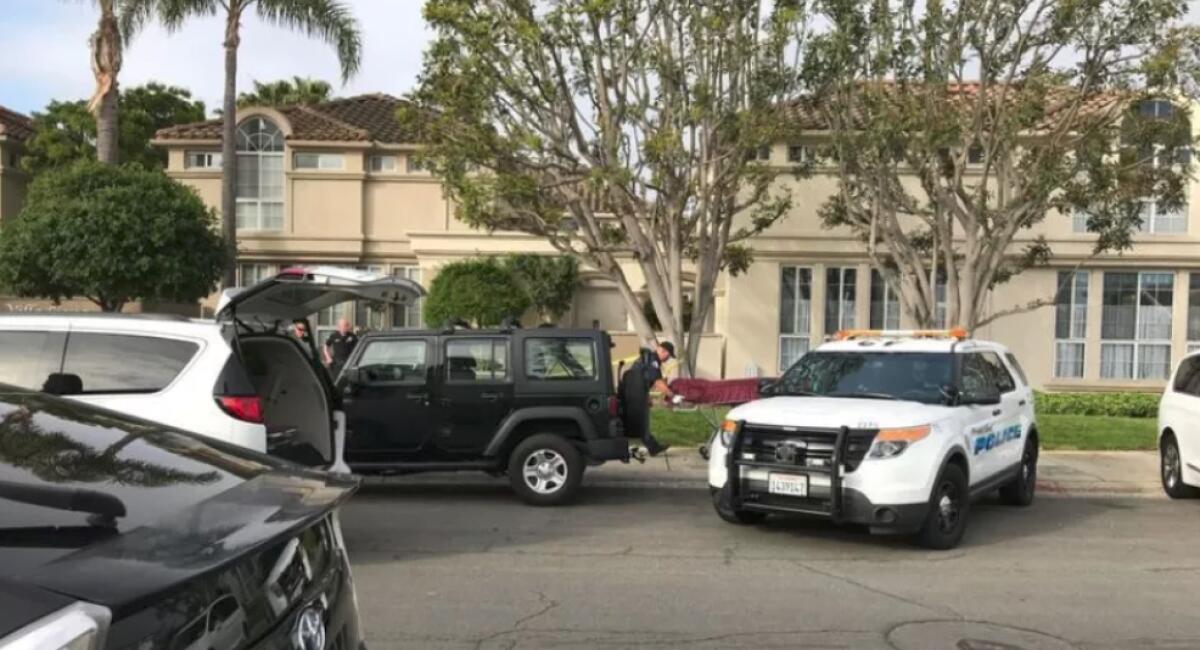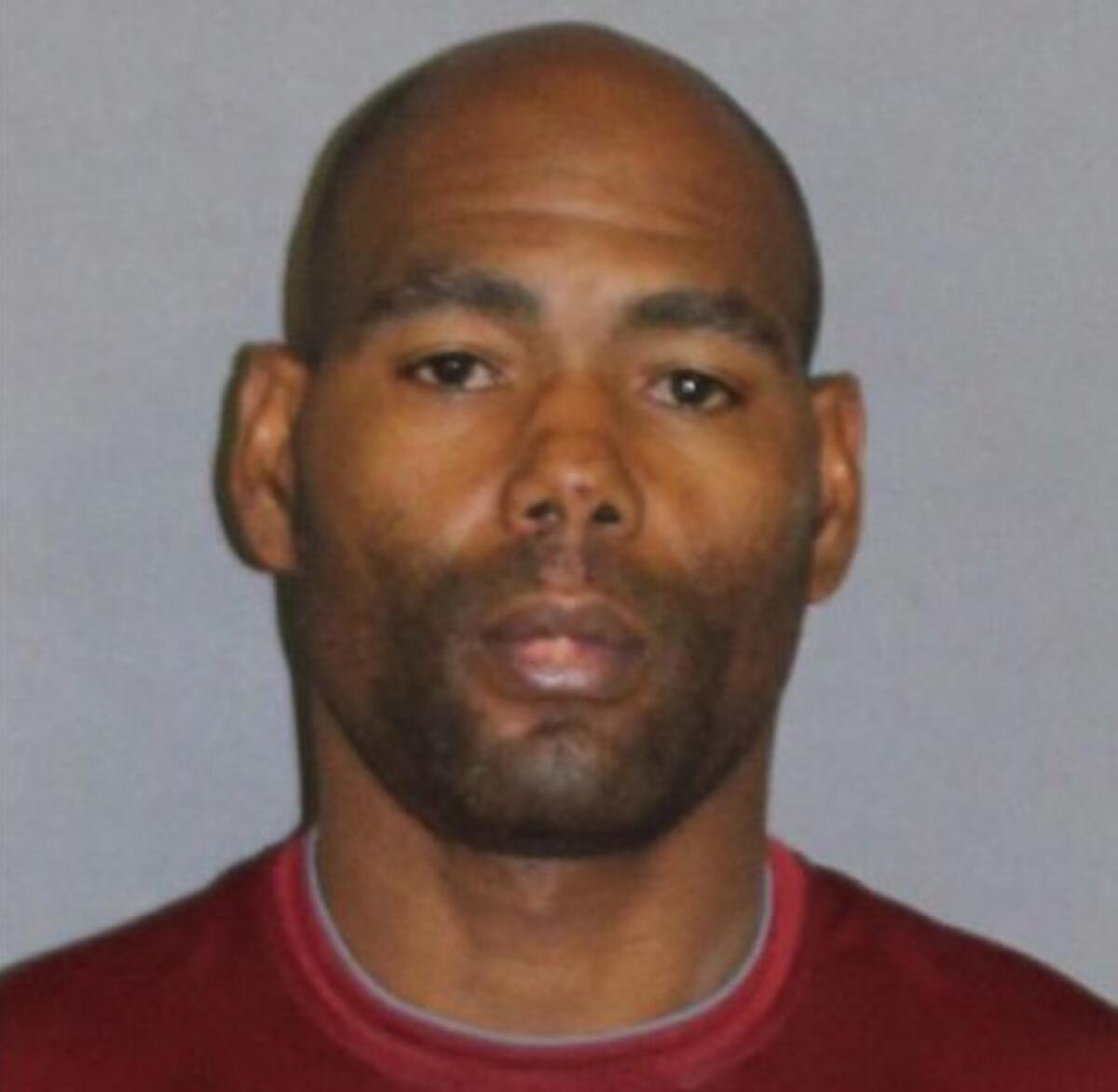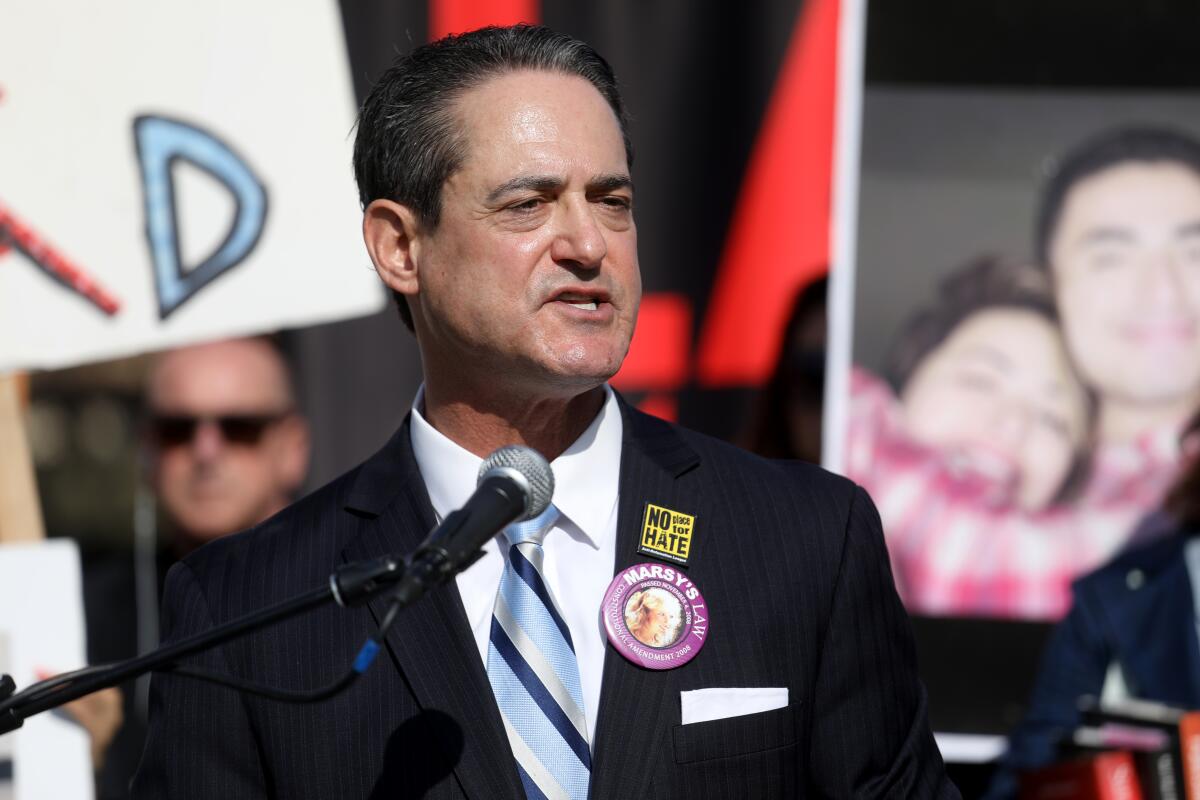Todd Spitzer made racist comments in a double murder case. The victims’ loved ones are worried

Dean Matheson walked into his Newport Beach condominium on April 21, 2019, to a scene that still haunts him.
His roommate, Darren Partch, was dead, gunned down in an execution-style killing.
Partch, 38, a retired hockey player turned businessman, was kind, funny and outgoing, Matheson said. He had a large group of close friends.
Wendi Miller, a woman Matheson did not know, also lay dead in Partch’s bedroom.
Within days, police identified a suspect, Jamon Buggs. While examining Buggs’ phone in connection to another crime, investigators noticed that he had been searching for Partch’s address.

Later, they found Partch’s phone number and address on a notepad in Buggs’ car, as well as photos of Partch on his cellphone.
Now, with Buggs’ trial scheduled to begin this month, racist comments by Orange County Dist. Atty. Todd Spitzer have cast a shadow over the case.
Prosecutors have decided not to seek the death penalty, angering Partch’s mother.
A judge is combing through several boxes of documents relating to Spitzer’s comments, raising the possibility Buggs’ sentence could be downgraded if he is convicted.
And Spitzer’s comments have damaged his bid for reelection as the county’s top prosecutor, with some supporters withdrawing their endorsements and civil rights groups calling for his resignation.
“It’s been devastating,” Matheson said in an interview with The Times. “It’s one thing to lose your best friend, but it’s another thing to lose them in a way that turned out to be so senseless.”

Buggs, a personal trainer and father of two who had been a standout running back in high school, was obsessed with an ex-girlfriend, according to prosecutors.
He called her incessantly and showed up at her house uninvited, the ex-girlfriend told police. In January 2019, she sought a temporary restraining order against him.
In late February or early March, she and Partch met at the gym, striking up a conversation about business before trading Instagram names so they could keep in touch. They were not dating, according to prosecutors.
When Buggs found out that the two were messaging, he called Partch and said to stay away, prosecutors say.
Partch told Buggs he would comply and asked the ex-girlfriend not to contact him anymore, according to court records.
Still, according to prosecutors, Buggs’ jealousy drew him to Partch’s apartment sometime after 1:45 a.m. on April 20, armed with a .38-caliber handgun.
When Matheson found the bodies hours later, Miller was lying on the floor of the bedroom. Partch was on his knees next to the bed with his arm resting on the mattress. Both had been shot in the head.
Prosecutors believe Partch and Miller were caught by surprise and didn’t have time to defend themselves.
Miller, 48, was a mother of two and the chief executive of Wings for Justice, a nonprofit that advocates for children in the family court system.
She had met Partch hours earlier while out with friends, offering him a ride home because they lived near each other.
Roughly 18 hours after Partch and Miller were killed, a woman in Irvine reported that a man had been standing on her balcony looking through the sliding glass door.
After the woman screamed and the man fled, she heard what sounded like a gunshot.
The next night, police set up surveillance, in case the intruder returned. They tried to pull over a Chevrolet Camaro, and the driver led them on a two-mile pursuit before being apprehended and arrested.
The driver was Buggs. A bullet lodged in the eaves of the Irvine condo matched the ones that killed Partch and Miller.
Investigators suspect that, the evening after killing them, Buggs went to the Irvine neighborhood in search of another man he thought was dating his ex-girlfriend.
With Buggs, now 47, behind bars, the double murder case slowly moved toward trial.
On Oct. 1 last year, Spitzer and other top prosecutors held a marathon meeting to discuss whether to seek the death penalty against Buggs.
During part of the meeting, Buggs’ attorneys presented evidence that he had chronic traumatic encephalopathy after repeated blows to the head on the football field.
They also said that Buggs, who is Black, was taunted with racial slurs while attending an all-white high school in San Diego.
With only the prosecutors present, Spitzer turned to the dating habits of Black men.
Spitzer told the group that he knows “many black people who get themselves out of their bad circumstances and bad situations by only dating white women,” according to a memo by then-prosecutor Ebrahim Baytieh.
Buggs’ ex-girlfriend was white.
Spitzer then doubled down and continued discussing race, even after Baytieh warned him that it was inappropriate and could damage the case, according to the memo.
Spitzer disputes the wording of his comments, telling The Times that he described Black men’s motivation in dating white women as improving “their stature in the community.”
But he has publicly apologized, saying he “used an example that was insensitive.”
The majority of prosecutors at the Oct. 1 meeting initially voted in favor of the death penalty.
Baytieh, meanwhile, believed that Spitzer had violated a state law forbidding prosecutors from using race against a defendant. He sent a memo to Spitzer and other colleagues arguing that Buggs’ attorneys should be informed of the comments.
Spitzer later fired Baytieh, citing the veteran prosecutor’s actions in an unrelated case.
In January, Spitzer assigned the Buggs case to a new team of prosecutors. He took the unusual step of forbidding the new team from discussing the case with the old team, including all the prosecutors who attended the Oct. 1 meeting.
The next day, Senior Deputy Dist. Atty. David Porter submitted a document to the court — he would not be pursuing the death penalty against Buggs.
In a letter to the court, Spitzer wrote that the “only decision” he made after the Oct. 1 meeting was to seek life without the possibility of parole.
If there had been a violation of the state law forbidding prosecutors from using race against a defendant, the death penalty would be off the table, Spitzer wrote, while noting that was “unrelated to his decision.”
After media outlets reported his racist comments in February, Spitzer told The Times that what swayed him away from the death penalty was evidence about Buggs’ brain injuries and racial trauma that defense attorneys presented at the Oct. 1 meeting.
“It was their defenses and what I believed was going to be presented in front of the jury that I believe we would not be able to get a death verdict,” Spitzer said.
Brenda Partch, Darren’s mother, was dismayed by Spitzer’s decision not to seek the death penalty, her attorney Richard Welsh said.
To make matters worse, prosecutors did not immediately inform her of the change.
Even though a defendant hasn’t been executed in California since 2006, the death penalty would have been symbolic justice, Welsh said.
“This entire episode has been extraordinarily stressful for my client,” he said.
Spitzer’s comments could have broad ramifications for Buggs’ prosecution, experts say.
Buggs is facing two counts of murder, with special circumstance enhancements for using a firearm and for committing multiple murders.
The mandatory punishment is life without parole, so Buggs is not likely to receive less time than that, said Lawrence Rosenthal, a law professor at Chapman University.
However, Rosenthal said, Buggs’ attorneys could seek sanctions for Spitzer’s comments that could reduce Buggs’ prison time.
In a motion in late February, one of Buggs’ attorneys, Michael Hill, requested copies of memos and emails between prosecutors discussing Spitzer’s comments.
Hill also requested information that could show efforts by Spitzer and other senior staff members to cover up the statements.
“The evidence the defense already has shows the District Attorney himself made racist remarks while considering the appropriate penalty for the defendant, that he delayed disclosing those remarks, and that he may have lied about his actions surrounding the issue,” Hill, who is director of the Orange County Associate Defender’s office, wrote in the motion.
In response to the motion, the judge, Gregg Prickett, is reviewing hundreds of pages of internal emails and memos connected to Spitzer’s comments, to decide which, if any, documents to give to the defense.
Prickett’s review will not be completed before Buggs’ trial is scheduled to begin on April 18.
Buggs elected not to seek a delay that would have allowed the review to be completed first. Depending on the outcome of the review, his attorneys could still use the documents to try to reduce his sentence after the trial.
The biggest consequence of Spitzer’s comments may have already happened.
If prosecutors thought Buggs deserved the death penalty and were forced to dial back because Spitzer covered up his comments, that would be “extraordinarily troubling,” said Rosenthal, the Chapman law professor.
Matheson, 42, an attorney, has tried to remain focused on preserving Partch’s memory — the jokes they shared, the quiet nights just hanging out and their weekly roller hockey games on the beach.
Most of all, he recalls Partch’s reminders to slow down and focus on the people who matter most — something he has kept in mind as he got married and had kids.
“Knowing him really did change my life,” Matheson said.
More to Read
Sign up for Essential California
The most important California stories and recommendations in your inbox every morning.
You may occasionally receive promotional content from the Los Angeles Times.











